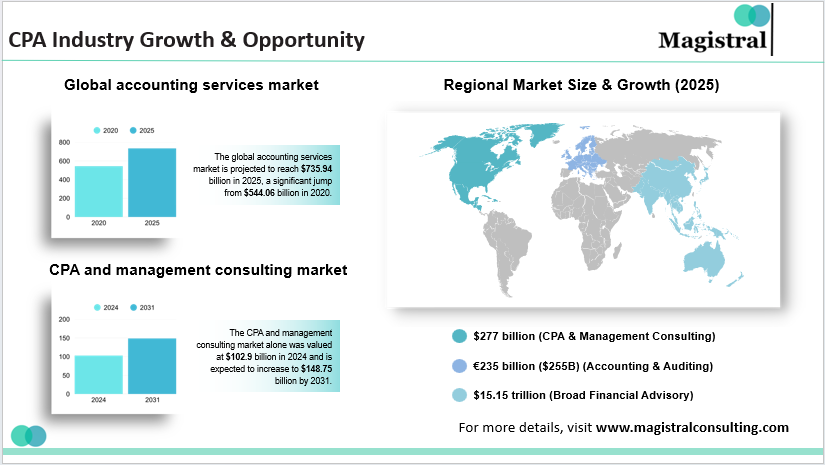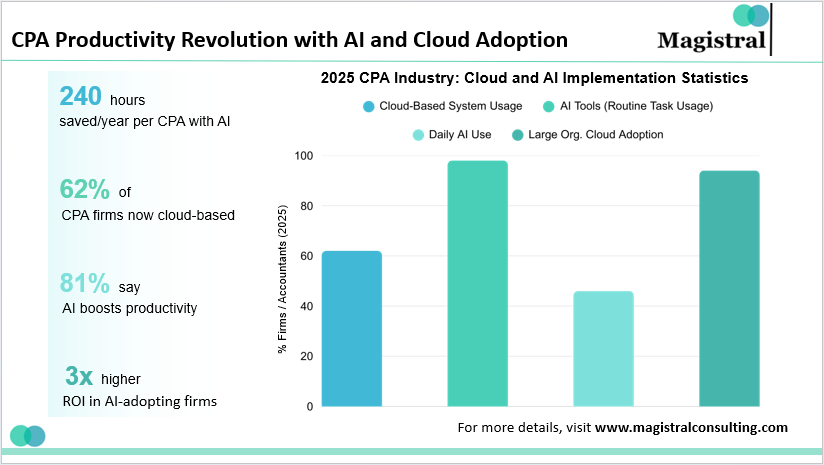New technology and evolving client requirements are making the accounting industry change swiftly. Starting your own CPA company is the ideal method for many CPAs to be their own boss since it lets them be autonomous, expand their business, and generate money. But starting and sustaining a CPA company in 2025 requires more than just technological abilities. It requires a strategy for the future that aligns with what the market is doing, as well as digital tools and a plan for the future.
Why Starting a CPA Firm in 2025 Is a Strategic Move
The world market for accounting services was worth $640 billion in 2024. It is predicted to rise by 6.2% per year until it reaches $900 billion in 2032. The Bureau of Labor Statistics forecasts that the number of employment for CPAs will rise by 4% by 2032. This is because the regulations are growing harder to follow and people want more strategic counsel.

CPA Industry Growth & Opportunity
AICPA says that advising services expanded by 12% from 2023 to 2024, which is greater than the growth of conventional tax and audit services. If you want to launch a CPA business that provides both compliance and high-value advising services, you should take advantage of this trend.
Trends Redefining CPA Firms in 2025
The accounting industry is undergoing a profound shift driven by technology, evolving client expectations, and the rise of remote work. These changes are not just incremental; they’re reshaping the core of how CPA firms operate and deliver value. Below are the key trends transforming the landscape and defining the future of starting a CPA firm in 2025.
Cloud and AI Are the New Normal

CPA Productivity Revolution with AI and Cloud Adoption
78% of small and medium-sized firms utilize cloud-based accounting software such as QuickBooks and Xero.AI-powered auditing solutions decrease the time it takes to manually evaluate by 40%, which makes the process faster and more accurate.
Advisory Services Taking Center Stage
By 2026, Client Advisory Services (CAS) will bring in 30% of CPA firm revenues, up from 18% in 2020. Businesses want more than simply following the rules; they want financial strategies that look to the future.
Virtual and Hybrid Models Dominate
Allowing workers to work from home lets companies recruit individuals from all over the globe and serve customers in various regions of the world. Virtual-first businesses may save up to 35% on overhead expenditures compared to regular businesses.
Cybersecurity Is Non-Negotiable
There is no question about cybersecurity. Financial data breaches climbed by 22% in 2024, therefore every CPA business has to have adequate data protection in place.
Building a Digital-First CPA Practice
Digital transformation is at the heart of modern CPA firms. A digital-first approach focuses on cloud accounting, secure online portals, and automated workflows that make processes faster and more client-friendly. By using advanced tech tools for real-time reporting and seamless communication, firms can enhance efficiency, reduce costs, and deliver superior client experiences. Embracing digital-first operations positions a CPA firm to compete in an increasingly virtual and global marketplace.
Developing Strategic Partnerships for Growth
Strategic alliances with financial advisors, attorneys, and technology consultants can significantly accelerate growth for CPA firms. These partnerships open new client pipelines, create opportunities for bundled services, and add value through complementary expertise. By collaborating with other professionals and leveraging referral networks, CPA firms can enhance credibility, expand service offerings, and increase profitability. Building and nurturing these relationships is key to long-term sustainability and competitive advantage.
Technology as a Growth Catalyst
The money you invest on technology when you establish a CPA business will help you beat your competition.
Important Tech Stack
An essential tech stack is the backbone of a modern CPA firm. Cloud-based accounting solutions such as QuickBooks, Xero, and NetSuite enable seamless financial management and real-time collaboration. Workflow automation tools like Jetpack Workflow eliminate repetitive tasks, improving efficiency across processes. AI-driven analytics offer predictive modeling for revenue forecasting and tax planning, while secure portals and chatbots ensure smooth, real-time client communication. According to a 2024 Thomson Reuters survey, firms leveraging automation reduced costs by 18% and improved client retention by 25%, underscoring the strategic value of technology in driving growth and operational excellence.
Regulatory and Compliance Considerations
Compliance is a critical pillar for starting and sustaining a CPA firm in 2025. Every firm must adhere to state CPA board licensing requirements, which vary by jurisdiction but typically include minimum education, experience, and continuing education standards. For firms offering assurance services, peer reviews are often mandatory, ensuring adherence to professional quality benchmarks. Data protection is equally vital; according to the FTC’s Safeguards Rule, firms must implement robust cybersecurity measures to protect client financial information, a priority as financial data breaches surged by 22% in 2024. Additionally, non-compliance with data security standards can result in penalties of up to $100,000 per violation for firms and $10,000 for individuals, underscoring the importance of stringent regulatory alignment and cyber hygiene practices.
Talent Acquisition and Retention Challenges
Attracting and retaining skilled accountants is becoming one of the biggest challenges for CPA firms in 2025. According to the AICPA, the accounting profession faces a projected 75% retiree replacement gap by 2030, creating an intense demand for qualified talent. In fact, 83% of CPA firms report difficulty in hiring experienced staff, and the average time to fill a senior accounting role has increased to 6-8 weeks. To stay competitive, firms are offering flexible work models: currently adopted by 78% of accounting firms; along with professional development programs and performance-based incentives. These strategies are crucial to overcome the growing talent shortage and sustain business growth.
The Future of CPA Firms: 2026 and Beyond
The next five years will significantly transform the role of a CPA as automation and technology reshape the industry. By 2030, machines will handle 50% of all accounting labor, while AI-driven tools will enable predictive tax methods and advanced risk analytics for enhanced forecasting. The rise of global virtual firms will allow access to diverse skill sets 24/7, and ESG reporting will become a critical requirement, with 70% of public firms expected to adopt standardized ESG frameworks by 2028.
Experts project the accounting services industry to surpass $900 billion by 2032, driven by a growing demand for CPA services, which is expected to increase by 6.2% annually through 2030. To remain competitive, firms must embrace technology, advisory-based models, and specialized expertise, while proficiency in digital marketing and cybersecurity becomes a necessity rather than an option. Launching a CPA firm today is not just a business venture; it is a strategic investment in the future of finance, where trust and competence will define successful business relationships.
How Magistral Consulting Can Help New CPA Firms
Magistral Consulting supports new CPA firms by providing comprehensive offshore outsourcing services that streamline core accounting and boost growth potential. Their team handles high-volume transactional tasks—like bookkeeping, invoicing, collections, payroll, bank reconciliations, and general ledger maintenance—freeing CPAs to focus on strategic advisory and client relationships. They also manage statutory compliance, financial statement preparation, tax filing, and GAAP-aligned checks, ensuring reliable accuracy and adherence to standards. With advanced analytics, financial modeling, and ESG‑ready reporting capabilities, Magistral empowers CPA firms to scale efficiently, deepen specialization, and embrace emerging tech-driven advisory roles.
About Magistral Consulting
Magistral Consulting has helped multiple funds and companies in outsourcing operations activities. It has service offerings for Private Equity, Venture Capital, Family Offices, Investment Banks, Asset Managers, Hedge Funds, Financial Consultants, Real Estate, REITs, RE funds, Corporates, and Portfolio companies. Its functional expertise is around Deal origination, Deal Execution, Due Diligence, Financial Modelling, Portfolio Management, and Equity Research
For setting up an appointment with a Magistral representative visit www.magistralconsulting.com/contact
About the Author

Nitin is a Partner and Co-Founder at Magistral Consulting. He is a Stanford Seed MBA (Marketing) and electronics engineer with 19 + years at S&P Global and Evalueserve, leading research, analytics, and inside‑sales teams. An investment‑ and financial‑research specialist, he has delivered due‑diligence, fund‑administration, and market‑entry projects for clients worldwide. He now shapes Magistral Consulting’s strategic direction, oversees global operations, and drives business‑development support.
FAQs
Why is 2025 the right time to start a CPA firm?
What technology investments are essential for new CPA firms?
How much does it cost to start a CPA firm in 2025?
What compliance requirements must CPA firms meet?
What is the biggest challenge for CPA firms in 2025?